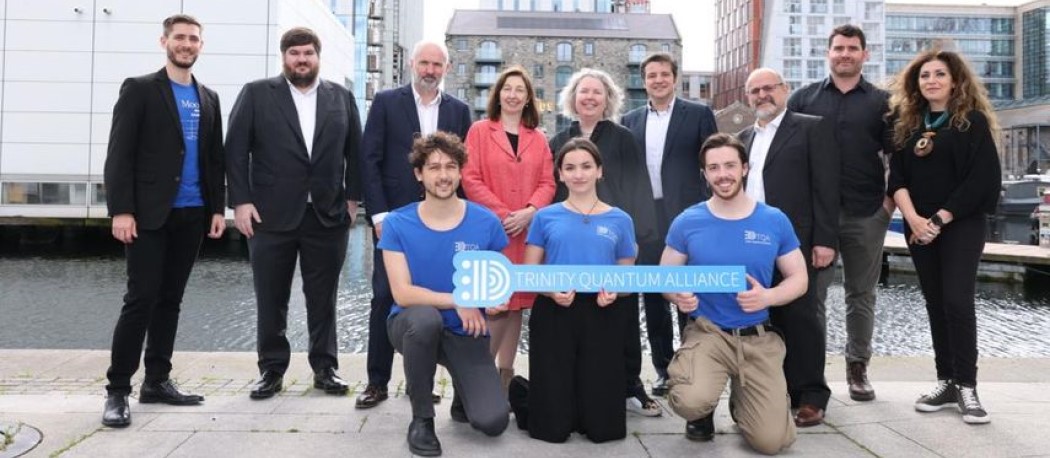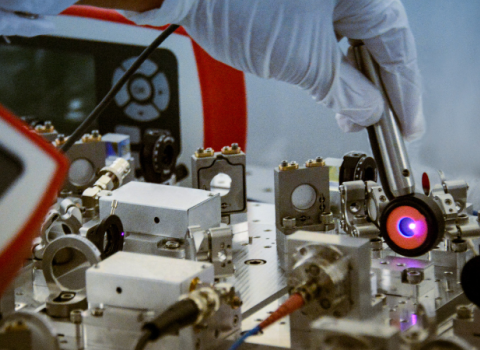
Romeo Radanyi, Director, Quantum Architecture, Moody’s Analytics; Dr Joe Fitzsimons, CEO, Horizon Quantum Computing; James O’Connor, Microsoft Ireland Site Lead and Vice President of Microsoft Global Operations Service Center; Professor Sinéad Ryan, Dean of Research, Trinity College Dublin; Dr Linda Doyle, Provost, Trinity College Dublin; Dr Juan Bernabe-Moreno, Director, IBM Research Europe – Ireland and UK; Professor Stefano Sanvito, Director of CRANN; Professor John Goold, Director of Trinity Quantum Alliance; Professor Sabrina Maniscalco, CEO and Co-Founder, Algorithmiq. Photo: Trinity College Dublin website.
The Trinity Quantum Alliance (TQA) will be the catalyst for investment in quantum technology in Ireland – with the ultimate goal being to construct a vibrant ecosystem to the benefit of various industry sectors. Together with Trinity, Microsoft, IBM, Horizon Quantum Computing, Algorithmiq and Moody’s Analytics are launching this exciting alliance as founding partners.
Quantum technology is a nascent multi-billion dollar industry aimed at exploiting the laws of quantum mechanics for advanced information and communication technology applications. The potential applications are diverse, ranging from communication to chemical simulation, and from sensing to computing.
While the development of quantum hardware requires significant investment over a prolonged period the development of quantum software is a much more open space, where many companies find profitable research niches that are expected to be transformative for many industries. In fact, quantum algorithms could revolutionise drug discovery, materials innovation and some aspects of the financial world, as well as helping us live more sustainable lives, to name but a few of the major societal impacts it promises.
The TQA ecosystem is powered by high-skilled graduates, educated via the Trinity MSc for Quantum Science and Technology and by a shared PhD programme. Thus, the TQA is responding to a growing demand for high-skilled quantum experts, the true engine for the quantum revolution. This activity will take place alongside the other research pillars of the alliance, which include quantum networks, high performance computing integration and fundamental quantum science.
Professor John Goold, Director of the Trinity Quantum Alliance, said:
“In Trinity’s unique MSc programme, which has been developed over the past three years, we have placed research and innovation at the centre of our teaching practices. The establishment of the Trinity Quantum Alliance will allow us to integrate research, education and industry in a seamless way with space available for virtual internships for our students.
“We are delighted to launch this alliance with Microsoft, IBM, Horizon Quantum Computing, Algorithmiq and Moody’s Analytics, with each of our founding partners bringing something unique to strengthen the alliance. We are excited to see the fruit this collaboration bears in the years to come.”
Dr Linda Doyle, Provost of Trinity, said:
“Quantum science is a fascinating area and it has the potential to deliver amazing new technologies. Our researchers are really pushing the boundaries in this space and the Trinity Quantum Alliance will bring a new focus to their efforts.
“Quantum is a great topic for collaboration between academic researchers and industry partners as it is deeply technical and deeply challenging, and it has an eye on the longer term future of these exciting technologies.”
James O’Connor, Microsoft Ireland Site Lead and Vice President of Microsoft Global Operations Service Center, said:
“Microsoft has enjoyed a long partnership with the team at Trinity and in recent years this has been strengthened through our combined focus on accelerating advancements in next-generation quantum technologies and attracting and training future world-leaders in the field. Quantum computing presents unprecedented possibilities to solve society’s most complex challenges and help to secure a sustainable future. That’s why we’re so passionate about the establishment of this Alliance. We look forward to playing our part in helping to nurture a vibrant quantum ecosystem in this country, one which I believe has the potential to benefit all of society.”
Dr Juan Bernabe-Moreno, Director IBM Research Europe — Ireland and UK, said:
”One of IBM’s goals is to make quantum computing available and accessible to as many people as possible — including the education necessary to prepare a growing quantum workforce. This is why we are pleased to participate in the Alliance, and support the Trinity MSc for Quantum Science and Technology and PhD programme.”
Dr Joe Fitzsimons, CEO of Horizon Quantum Computing, said:
"We believe that the TQA will provide a significant boost to the quantum ecosystem in Ireland and intend to play an active role in the initiative as we build up our presence here."
Professor Sabrina Maniscalco, CEO & Co-founder of Algorithmiq says:
“Over the last year, Algorithmiq and Trinity College Dublin's partnership has been very fruitful in offering high calibre and exceptional talent from Trinity’s Quantum department the opportunity to work in industry by joining Algorithmiq's mission in harnessing the power of quantum computing to solve complex problems in life sciences and realise a paradigm shift in drug discovery and development. We are therefore delighted to be part of the founding team members of the Trinity Quantum Alliance and join forces with other leading players in the field of quantum to further advance the progress of the quantum revolution.”
Sergio Gago, Managing Director Quantum Computing at Moody’s Analytics, said:
“The Trinity Quantum Alliance will enable us to collaborate with some of the top quantum scientists in the world and develop joint research projects in which Moody’s brings our finance and risk modelling expertise and the TQA brings top flight researchers. We are excited to see the innovative projects that can develop in this space including simulation, education and computation, furthering our mission to be at the forefront of this exciting technology for Moody’s customers.”
This article was first published on 5 May by Trinity College Dublin.





 A unique international forum for public research organisations and companies to connect their external engagement with strategic interests around their R&D system.
A unique international forum for public research organisations and companies to connect their external engagement with strategic interests around their R&D system.